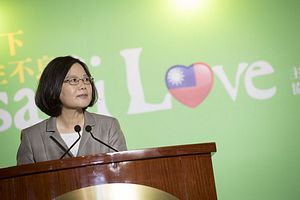It has been a year of firsts for Taiwan. Tsai Ing-wen became Taiwan’s first-ever female president, and her Democratic Progressive Party ousted the party of the Chinese Nationalists, the KMT, from parliament for the first time. Taiwan has also seen the first-ever public apology to its indigenous people by the first president with indigenous heritage.
“On behalf of the government, I express to you our deepest apology. For the four centuries of pain and mistreatment you have endured, I apologize to you on behalf of the government,” Tsai said in an address to leaders of Taiwan’s 16 officially recognized indigenous groups present at the ceremony in the Presidential Office on the morning of August 1.
Taiwan’s indigenous people are ethnically linked to inhabitants of other indigenous in Pacific territories, from Malaysia to Polynesia. They inhabited Taiwan long before the first Han Chinese migration started in the 17th century, but through centuries of forced assimilation, subjugation, Han migration, and intermarriage, the island’s official indigenous population now only makes up around 2 percent of Taiwan’s 23million people.
Their loss of ancestral land over the past centuries to the various rulers and migrants coming to the island is at the heart of their grievances – it has threatened their ability to continue their traditional way of life.
This is not just a thing of the past; encroachment on their ancestral land continues today. A vibrant indigenous activist movement has been protesting against issues such as the dumping of nuclear waste on Orchid Island, plans to open a stray dog park, or the construction of a luxury resort – all on land considered as ancestral by local aboriginal groups. And a court case against the indigenous Tama Talum, who was arrested after hunting for deer, a traditional way of living off the land, has become a landmark case for indigenous rights activists.
In her ceremonial apology, Tsai not only promised that indigenous people would receive greater autonomy, better protection of their language and culture, and an improvement of their land rights, she also vowed to allow indigenous leaders to participate in the process of “truth and reconciliation” that Tsai initiated earlier this year, which she referred to in her speech with the aboriginal term “Sbalay.” Taiwan had to face “the truth” to move forward “as a country of one people,” Tsai said.
Tsai’s presidency has focused on transitional justice since taking office in May 2016. This is a sign of the changed times in Taiwan where for the first time neither the presidency nor its parliament are in control of the KMT, which had long maintained that it would eventually gain control over mainland China. That ship has long sailed but it has left Taiwan in international limbo, and Taiwanese tired of the China-oriented policies of the KMT. Tsai’s Democratic Progressive Party (DPP) therefore won the elections in January by focusing on pro-Taiwan policies. But this is where the crux lies, particularly evident in the issue of indigenous land rights. Because what does it mean to be “Taiwanese”? And how can Tsai unite the people?
It will not be easy for Tsai to balance the rights of all 23 million people on the small island whilst recognizing the historic claim to ancestral land of roughly 500,000 indigenous people. The public apology is an important first step, with which she honored her campaign promise. But indigenous leaders remain skeptical, wondering whether Tsai’s policies for indigenous people will go far enough. A few days before her apology, several hundred indigenous activists protested for “sovereignty and peace,” it was reported.
Still, initiatives toward truth and reconciliation, and measures designed to bring Taiwan’s aborigines into mainstream society whilst attempting to preserve their diverse culture are much needed and long overdue.
Linda van der Horst holds a Master’s degree in Modern Chinese Studies from the University of Oxford. The views expressed here are her own.

































